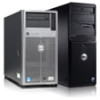Dell PowerEdge T320 Technical Guide - Page 20
DIMM 0, DIMM 1, Number, DIMMs, Speed MT/s, Feature, Description
 |
View all Dell PowerEdge T320 manuals
Add to My Manuals
Save this manual to your list of manuals |
Page 20 highlights
maximum speed supported by the processor, the speed settings in the BIOS, and the operating voltage of the system. Table 10 lists memory configuration and performance details for the T320 based on the population of the number and type of DIMMs per memory channel. DIMM type DIMM 0 DIMM 1 Number of DIMMs 800 SR 1 ∞ DR 1 ∞ UDIMM SR SR 2 ∞ SR DR 2 ∞ DR DR 2 ∞ SR 1 ∞ DR 1 ∞ QR 1 ∞ SR SR 2 ∞ RDIMM SR DR 2 ∞ DR DR 2 ∞ QR SR 2 ∞ QR DR 2 ∞ QR QR 2 ∞ Speed (MT/s) 1066 1333 ∞ ∞ ∞ 1600 RAS features help keep the system online and operational without significant impact to performance, and can decrease data loss and crashing due to errors. RAS aids in rapid, accurate diagnosis of faults that require service. Table 11 describes the RAS features supported on the T320. Feature Dense configuration optimized profile Memory demand and patrol scrubbing Recovery from single DRAM device failure Description Increased memory reliability can be a result from this selectable platform profile that adjusts parameters to reduce faults regarding refresh rates, speed, temperature and voltage Demand scrubbing is the ability to write corrected data back to the memory once a correctable error is detected on a read transaction. Patrol scrubbing proactively searches the system memory, repairing correctable errors. Recovery from Single DRAM Device Failure (SDDC) provides error checking and correction that protects against any single memory chip failure as well as multi-bit errors from any portion of a single memory chip.















